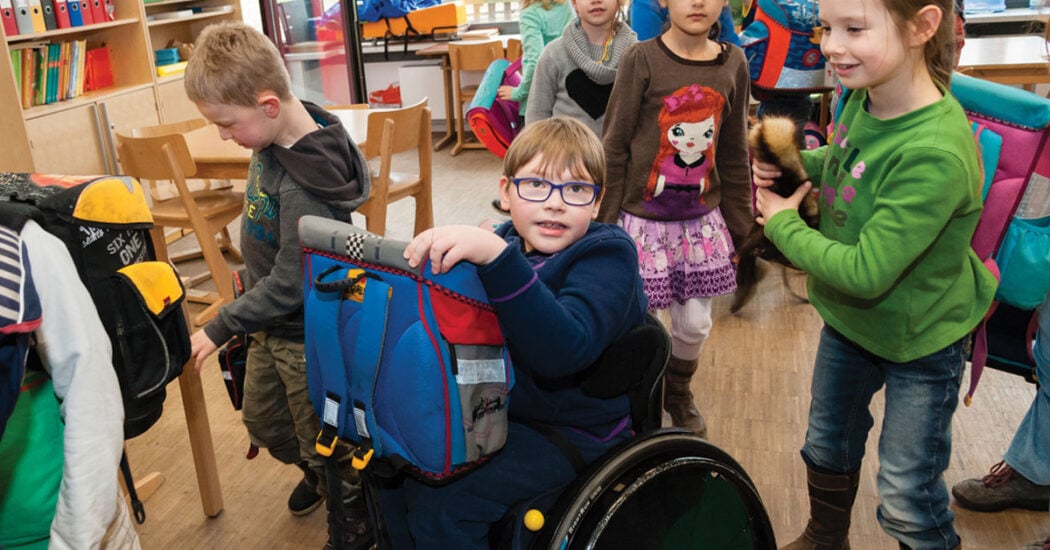
KJIPUKTUK (Halifax) – During Wednesday’s school update Dr. Strang said that “this will be a school year like we haven’t seen before,” and all indications suggest that he’s right.
Many teachers worry about the safety of the children in their care, how to maintain physical distance in crowded classrooms, and they are letting the world know at every opportunity.
A bit forgotten amidst all this noise are the students with disabilities or special needs, and their right to be a full part of the classroom community.
2020 will be the year that the provincial department of education will see its inclusion policies challenged in practice by the pandemic. Parents fear that it will not pass the test.
Corey Slumkoski has a 7-year-old daughter, Quinn. She’s set to begin grade one on Tuesday, a decision Slumkoski is weighing.
Living with Trisomy 21, Quinn’s immune system is much weaker than other children. Even though COVID-19 does not impact children in the same way it does adults, he’s cautious about sending his daughter back to school.
“Things that would give you or I a runny nose for a few days – a very minor cold – would put her in the hospital for a month, and incubated for two-weeks of that time,” he said.
Prioritizing Quinn’s health would mean potentially hurting her education and development.
Recently published Canadian data found that 58 per cent of parents of children with disabilities are concerned for their children’s school year and academic success, compared to 36 per cent of parents of children without disabilities.
Without a clearly articulated framework of service delivery, Slumkoski struggles to make an informed decision.
The provinces’ return to school plan says that there will be a plan in place for supporting students with specialized needs, although according to a compiled questionnaire issued by Autism Nova Scotia, there will not be continuity as to how support services will be offered in 2020/2021.
“The Department of Education issued a statement saying that they’re going to make sure people who need support will get support, and that will be negotiated or be discussed between individuals and their school.
“[This] strikes us as devolution of responsibility from the department of education to the individual schools,” Slumkoski said. “There is no guarantee that the support given to my daughter at her school will be the same as that given to somebody else’s daughter at another school.”
COVID-19 health & safety measures “in contradiction with inclusive education”
Nancy Spina, founder of Families for Inclusive Education Nova Scotia (FIENS), is concerned that the policy for inclusive education does not plan for children who at times may challenge the safety guidelines.
“We’re talking about an extra layer of rules that are going to be implemented in a very homogeneous way – and when you think about it, it’s in contradiction with inclusive education,” she said.
The Inclusive Education Policy – put into effect September 2020 – seeks to ensure that every student has access to an equitable and high-quality education.
For students with behavior disorders like Spina’s son, classroom health & safety measures like mask-wearing and social distancing can be difficult, especially after 6-months out of school.
Spina is worried that students will be “pushed out” of learning environments unless abiding by the rules.
“It is not realistic to think that all kids will abide by those rules. It has an ableist understanding of the child, this child that will abide by rules, and if she or he doesn’t abide, they’re going to be pushed out – that’s what we’re scared of.”
‘Overarching principles’ of the inclusive education policy will apply provincially.
In response to a question regarding the back to school plan, the department states that “Overarching principles found in guidance documents and the Inclusive Education Policy will apply provincially.”
The principles do not provide ways to meet inclusion objectives, and rather, “describe what all partners in education will achieve.”
“The problem I find and other families have found is the implementation of these plans – there is no actual accountability. It requires a lot of advocacy, a lot of knocking on doors, so the teams ideally put up a plan.”
Spina said that FIENS scheduled a meeting with the Halifax Regional Centre for Education (HRCE) to get more information, but HRCE canceled at the “last minute.”
According to Spina, HRCE said that they could meet at the end of the month.
“The issue is, end of September shit would have already hit the fan,” she said.
See also: A requiem for inclusion in Nova Scotia’s schools
With a special thanks to our generous donors who make publication of the Nova Scotia Advocate possible.
Subscribe to the Nova Scotia Advocate weekly digest and never miss an article again. It’s free!



